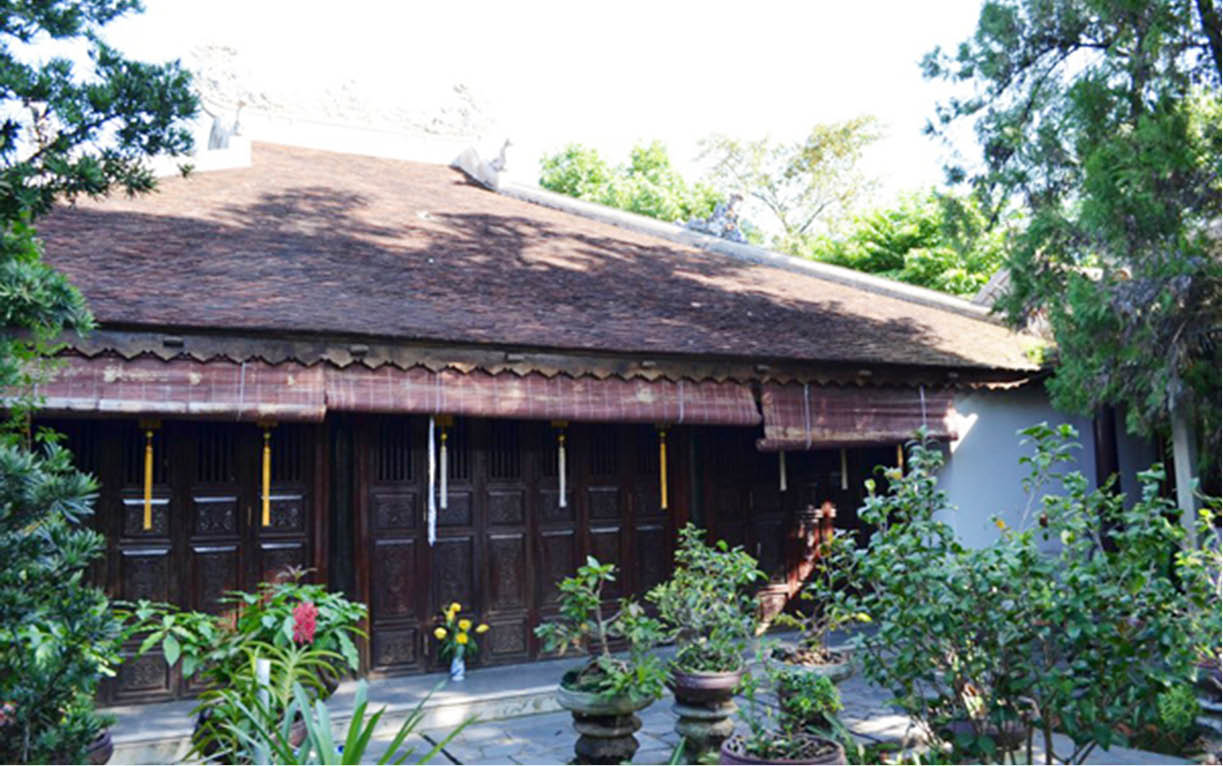At Nam Giao Esplanade, take the right turn into Le Ngo Cat St., you will see an old sign with the fading red letters. The pagoda is on a low slope. Though located in the city, Dong Thuyen Pagoda remains calm and peaceful thanks to its location at a high place.

The ancient pagoda of Dong Thuyen
A nun was drying conifer leaves as material for making incense in the yard of the pagoda. Seeing me, she happily opened the gate in welcome. A beautiful and vibrant flower garden appeared in front my eyes. I saw gorgeous blooming daisies, life plants, crown of thorns, etc.
Along the left aisle are red rose bushes reaching out to welcome visitors from afar. Red, yellow, purple, and green colors combine to create a harmonious lovely picture of nature.
On the right is a vegetable garden growing sweet potato buds, vine spinach, lettuce, etc. When I arrived, the nuns were weeding and picking vegetables.
The nuns told me about the history of the pagoda and their daily life in a friendly way. Dong Thuyen used to be a pagoda for monks but since Princess Ngoc Co’s time (Ngoc Co was Emperor Gia Long’s daughter) the pagoda has turned into one for nuns.
In the center of the yard is the white stony statue of Avalokiteśvara Bodhisattva under which are golden gilded dragons circling a small fish tank. I came into the main hall to offer incense.
There are many pictures in the hall, parallel sentences, poems, calligraphy, and Dharma books. Especially, there is a very beautiful watercolor painting about the enlightenment of the Buddha. Visitors to this pagoda are scarce, unlike other well-known pagodas in Hue.
Known as "Linh Son Dong Thuyen Co Tu” (Dong Thuyen ancient pagoda on Holy Mountain), this pagoda has a close connection with the Nguyen Dynasty, especially with Princess Ngoc Co, the 13th daughter of Emperor Gia Long.
At the age of 22, the princess was married to Nguyen Huynh Thanh and gave birth to two children. Unfortunately, in 1832, her husband and two princesses died one after another.
Realizing the impermanence of life, the princess decided to become a nun here. She spent her own money purchasing land and renovating the pagoda. She invited the famous monk Dao Tam Trung Hau from Thuyen Ton Pagoda to preside over the pagoda.
Behind the main hall, the princess had a worship house built for her family and established a cemetery on another hill. She bought fields from people in Duong Xuan Thuong and Duong Xuan Ha communes so that she could cultivate and used the profit for her worshipping of her family and her husband’s.
In 1856, the princess passed away and was given the title ‘Dinh Thai Hoa Truong Cong Chua’ by Emperor Tu Duc, and the posthumous name ‘Doan Nhan’.
The other two women who left their imprints here were Mrs. Bui Mong Diep and nun Vien Thong. Bui Mong Diep is the unofficial wife of King Bao Dai. She was worshipped in the worship house of Princess Ngoc Co.
Nun Vien Thong was Lord Kien An’s daughter, who became a nun together with her aunt, Princess Ngoc Co. The nun had an unlucky love affair. Her engaged husband unfortunately died before the wedding.
Although Dong Thuyen is not a big pagoda in Hue, it has witnessed many ups and downs and historical changes. You will feel very close and familiar upon visiting this pagoda exclusively for nuns.
Story and photo: Le Thuc Dan